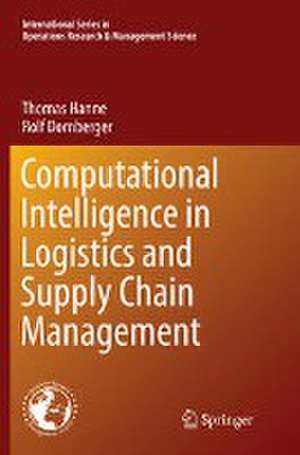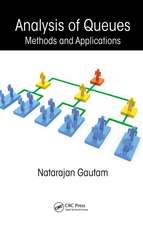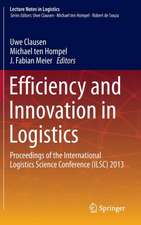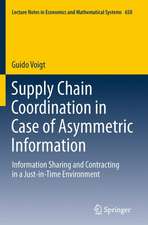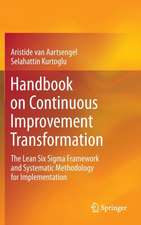Computational Intelligence in Logistics and Supply Chain Management: International Series in Operations Research & Management Science, cartea 244
Autor Thomas Hanne, Rolf Dornbergeren Limba Engleză Paperback – 12 iun 2018
The first two chapters provide general introductions to logistics and supply chain management on the one hand, and to computational intelligence on the other hand. The subsequent chapters cover specific fields in logistics and supply chain management, work out the most relevant problems found in those fields, and discuss approaches for solving them. Chapter 3 discusses problems in the field of production and inventory management. Chapter 4 considers planning activities on a finer level of granularity which is usually denoted as scheduling. In chapter 5 problems in transportation planning such as different types of vehicle routing problems are considered. While chapters 3 to 5 rather discuss planning problems which appear on an operative level, chapter 6 discusses the strategic problem of designing a supply chain or network. The final chapter provides an overview of academic and commercial software and information systems for the discussed applications.
There appears to be a gap between general textbooks on logistics and supply chain management and more specialized literature dealing with methods for computational intelligence, operations research, etc., for solving the complex operational problems in these fields. For readers, it is often difficult to proceed from introductory texts on logistics and supply chain management to the sophisticated literature which deals with the usage of advanced methods. This book fills this gap by providing state-of-the-art descriptions of the corresponding problems and suitable methods for solving them.
| Toate formatele și edițiile | Preț | Express |
|---|---|---|
| Paperback (1) | 692.09 lei 6-8 săpt. | |
| Springer International Publishing – 12 iun 2018 | 692.09 lei 6-8 săpt. | |
| Hardback (1) | 945.79 lei 6-8 săpt. | |
| Springer International Publishing – 9 aug 2016 | 945.79 lei 6-8 săpt. |
Din seria International Series in Operations Research & Management Science
- 20%
 Preț: 331.25 lei
Preț: 331.25 lei - 20%
 Preț: 570.61 lei
Preț: 570.61 lei - 18%
 Preț: 1132.02 lei
Preț: 1132.02 lei - 18%
 Preț: 773.72 lei
Preț: 773.72 lei -
 Preț: 170.39 lei
Preț: 170.39 lei - 17%
 Preț: 459.34 lei
Preț: 459.34 lei - 17%
 Preț: 360.47 lei
Preț: 360.47 lei -
 Preț: 263.40 lei
Preț: 263.40 lei - 24%
 Preț: 905.30 lei
Preț: 905.30 lei - 17%
 Preț: 460.08 lei
Preț: 460.08 lei - 17%
 Preț: 459.34 lei
Preț: 459.34 lei - 20%
 Preț: 631.58 lei
Preț: 631.58 lei - 13%
 Preț: 448.62 lei
Preț: 448.62 lei - 18%
 Preț: 738.28 lei
Preț: 738.28 lei - 18%
 Preț: 1225.94 lei
Preț: 1225.94 lei - 18%
 Preț: 948.92 lei
Preț: 948.92 lei - 18%
 Preț: 703.88 lei
Preț: 703.88 lei - 18%
 Preț: 957.44 lei
Preț: 957.44 lei - 15%
 Preț: 651.84 lei
Preț: 651.84 lei - 20%
 Preț: 336.21 lei
Preț: 336.21 lei - 15%
 Preț: 641.03 lei
Preț: 641.03 lei -
 Preț: 404.29 lei
Preț: 404.29 lei - 18%
 Preț: 950.21 lei
Preț: 950.21 lei - 15%
 Preț: 649.06 lei
Preț: 649.06 lei - 18%
 Preț: 725.75 lei
Preț: 725.75 lei -
 Preț: 394.12 lei
Preț: 394.12 lei - 18%
 Preț: 951.47 lei
Preț: 951.47 lei - 15%
 Preț: 639.59 lei
Preț: 639.59 lei - 18%
 Preț: 773.06 lei
Preț: 773.06 lei - 18%
 Preț: 889.29 lei
Preț: 889.29 lei - 15%
 Preț: 655.60 lei
Preț: 655.60 lei - 15%
 Preț: 640.06 lei
Preț: 640.06 lei - 15%
 Preț: 583.93 lei
Preț: 583.93 lei
Preț: 692.09 lei
Preț vechi: 814.22 lei
-15% Nou
Puncte Express: 1038
Preț estimativ în valută:
132.44€ • 137.49$ • 110.44£
132.44€ • 137.49$ • 110.44£
Carte tipărită la comandă
Livrare economică 22 martie-05 aprilie
Preluare comenzi: 021 569.72.76
Specificații
ISBN-13: 9783319821641
ISBN-10: 3319821644
Ilustrații: XX, 176 p. 20 illus., 14 illus. in color.
Dimensiuni: 155 x 235 mm
Greutate: 0.29 kg
Ediția:Softcover reprint of the original 1st ed. 2017
Editura: Springer International Publishing
Colecția Springer
Seria International Series in Operations Research & Management Science
Locul publicării:Cham, Switzerland
ISBN-10: 3319821644
Ilustrații: XX, 176 p. 20 illus., 14 illus. in color.
Dimensiuni: 155 x 235 mm
Greutate: 0.29 kg
Ediția:Softcover reprint of the original 1st ed. 2017
Editura: Springer International Publishing
Colecția Springer
Seria International Series in Operations Research & Management Science
Locul publicării:Cham, Switzerland
Cuprins
Introduction to Logistics and Supply Chain Management.- Computational Intelligence.- Transportation Problems.- Inventory Planning and Lot-Sizing.- Scheduling.- Location Planning and Network Design.- Intelligent Software for Logistics.
Notă biografică
Thomas Hanne received master's degrees in Economics and Computer Science, and a PhD in Economics. From 1999 to 2007 he worked at the Fraunhofer Institute for Industrial Mathematics (ITWM) as senior scientist. Since then he is Professor for Information Systems at the University of Applied Sciences and Arts Northwestern Switzerland and Head of Competence Center Systems Engineering since 2012.
Thomas Hanne is author of about 80 journal and conference articles and editor of several journals and special issues. His current research interests include multicriteria decision analysis, evolutionary algorithms, metaheuristics, optimization, simulation, logistics, and supply chain management.
Rolf Dornberger is the head of the Institute for Information Systems, School of Business, University of Applied Sciences and Arts Northwestern Switzerland FHNW (since 2007) and the head of the competence centers New Trends & Innovation (since 2013) and Technology, Organization & People (since 2014) and was head of the competence center Systems Engineering (2006 - 2010). In 2002, he was appointed associate professor and, in 2003, full professor for Information Systems at the University of Applied Sciences and Arts Northwestern Switzerland FHNW or rather at its predecessor the University of Applied Sciences Solothurn Switzerland. Additionally, he was a part-time lecturer and visiting professor at the University of Stuttgart and the University of Applied Sciences Zurich. Before returning to academy, he worked in industry in different management positions as a consultant, IT officer and senior researcher in different engineering, technology and IT companies in the field of power generation systems and IT solutions for the airline business. He holds a PhD (1998) and a Diploma degree in Aerospace Engineering (1994). His current research interests include computational intelligence, optimization, innovation and technology management, and new trends and innovations.
Thomas Hanne is author of about 80 journal and conference articles and editor of several journals and special issues. His current research interests include multicriteria decision analysis, evolutionary algorithms, metaheuristics, optimization, simulation, logistics, and supply chain management.
Rolf Dornberger is the head of the Institute for Information Systems, School of Business, University of Applied Sciences and Arts Northwestern Switzerland FHNW (since 2007) and the head of the competence centers New Trends & Innovation (since 2013) and Technology, Organization & People (since 2014) and was head of the competence center Systems Engineering (2006 - 2010). In 2002, he was appointed associate professor and, in 2003, full professor for Information Systems at the University of Applied Sciences and Arts Northwestern Switzerland FHNW or rather at its predecessor the University of Applied Sciences Solothurn Switzerland. Additionally, he was a part-time lecturer and visiting professor at the University of Stuttgart and the University of Applied Sciences Zurich. Before returning to academy, he worked in industry in different management positions as a consultant, IT officer and senior researcher in different engineering, technology and IT companies in the field of power generation systems and IT solutions for the airline business. He holds a PhD (1998) and a Diploma degree in Aerospace Engineering (1994). His current research interests include computational intelligence, optimization, innovation and technology management, and new trends and innovations.
Textul de pe ultima copertă
This book deals with complex problems in the fields of logistics and supply chain management and discusses advanced methods, especially from the field of computational intelligence (CI), for solving them.
The first two chapters provide general introductions to logistics and supply chain management on the one hand, and to computational intelligence on the other hand. The subsequent chapters cover specific fields in logistics and supply chain management, work out the most relevant problems found in those fields, and discuss approaches for solving them. Chapter 3 discusses problems in the field of production and inventory management. Chapter 4 considers planning activities on a finer level of granularity which is usually denoted as scheduling. In chapter 5 problems in transportation planning such as different types of vehicle routing problems are considered. While chapters 3 to 5 rather discuss planning problems which appear on an operative level, chapter 6 discusses the strategic problem of designing a supply chain or network. The final chapter provides an overview of academic and commercial software and information systems for the discussed applications.
There appears to be a gap between general textbooks on logistics and supply chain management and more specialized literature dealing with methods for computational intelligence, operations research, etc., for solving the complex operational problems in these fields. For readers, it is often difficult to proceed from introductory texts on logistics and supply chain management to the sophisticated literature which deals with the usage of advanced methods. This book fills this gap by providing state-of-the-art descriptions of the corresponding problems and suitable methods for solving them.
The first two chapters provide general introductions to logistics and supply chain management on the one hand, and to computational intelligence on the other hand. The subsequent chapters cover specific fields in logistics and supply chain management, work out the most relevant problems found in those fields, and discuss approaches for solving them. Chapter 3 discusses problems in the field of production and inventory management. Chapter 4 considers planning activities on a finer level of granularity which is usually denoted as scheduling. In chapter 5 problems in transportation planning such as different types of vehicle routing problems are considered. While chapters 3 to 5 rather discuss planning problems which appear on an operative level, chapter 6 discusses the strategic problem of designing a supply chain or network. The final chapter provides an overview of academic and commercial software and information systems for the discussed applications.
There appears to be a gap between general textbooks on logistics and supply chain management and more specialized literature dealing with methods for computational intelligence, operations research, etc., for solving the complex operational problems in these fields. For readers, it is often difficult to proceed from introductory texts on logistics and supply chain management to the sophisticated literature which deals with the usage of advanced methods. This book fills this gap by providing state-of-the-art descriptions of the corresponding problems and suitable methods for solving them.
Caracteristici
Presents the state of the art in using computational intelligence in supply chain and logistic problems Addresses problems in inventory and production planning, scheduling, transportation, and network design Reviews the available software and information systems for each of the problem areas covered?
